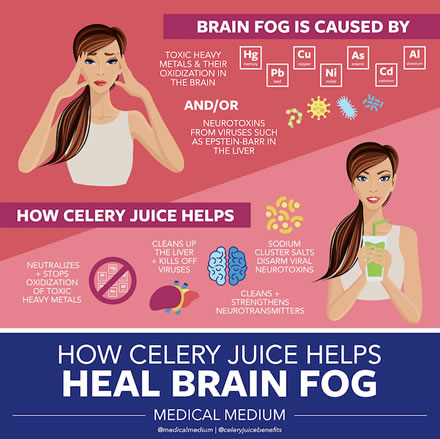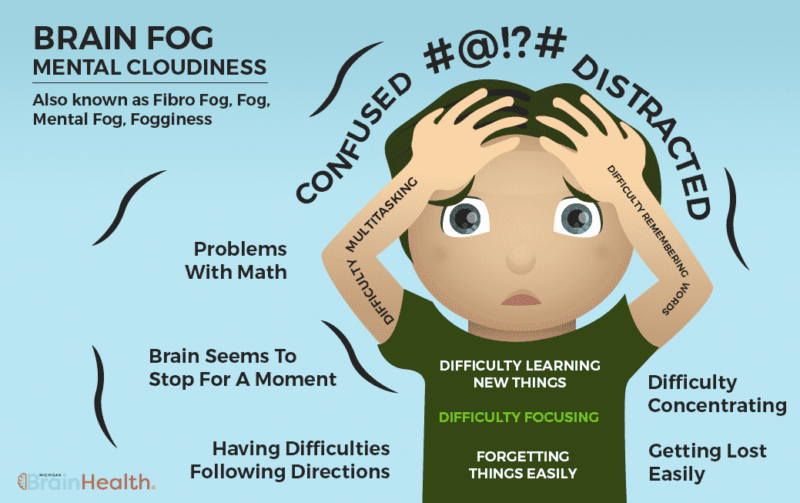

They include fresh peppermint, sage, thyme, hot and sweet peppers, radicchio, celery seeds.
Brain fog treatment food how to#
Studies show that a higher intake of cruciferous vegetables, including kale, broccoli and cabbage, is significantly associated with lower circulating levels of inflammatory markers. How to fight brain fog with food: Tips from a psychiatrist Foods rich in luteolin. Curcumin (turmeric) the substance that gives curry its yellow color is also an anti-inflammatory that may help improve both memory and mood. Kale - This powerhouse veggie is shown to decrease inflammation and reduce mood symptoms. Vitamins and nutrients like omega-3 fatty acids, high-quality multivitamins, Vitamin C, Vitamin D, and curcumin, and others have been shown in peer-reviewed studies to give the brain a boost.When your gut feels better you feel better, making it easier to sleep and exercise, directly improving mental health and daily functioning. Brown rice - High-fiber foods like brown rice can improve the movement of food through your digestive tract and minimize uncomfortable symptoms like heartburn, bloating and constipation. PTSD is estimated to affect 3.9 per cent of people worldwide at some point in their lives.Other foods high in tryptophan include whole grain cereals and wheat germ. Serotonin affects mood, cognition and behavior, while melatonin affects your sleep-wake cycle - essential for optimal mental health. Oats - Oats contain tryptophan, which the body uses to make serotonin and melatonin.
 Sweet potatoes - Sweet potatoes are high in complex carbohydrates that increase serotonin, which directly affects mood and can lead to improved energy levels. Walnuts - Together with other foods high in omega-3 fats, such as soybeans and ground flaxseed, walnuts have been shown to improve mood and support brain health. Berries - Berries are high in polyphenols, a natural compound found in plant-based foods, that can boost cognitive function to support a healthy brain. Matthew Lederman, MD, and Lifesum Advisor, says to keep the following items stocked to boost mental health and productivity. Food allergy induces alteration in brain inflammatory status and cognitive impairments. The relation between vitamin D deficiency and fibromyalgia syndrome in women. Brain fog treatment depends on the cause. food sensitivities and diet deficiencies. Some of the most common causes include: stress. In some cases, brain fog, or cognitive impairment, can last many months after the disease has passed. Living with fibromyalgia, drugs approved to manage pain. Some foods and drinks that are rich in histamine include: alcohol aged cheeses canned, pickled, and fermented foods, such as sauerkraut smoked products, such as sausage, ham, bacon, or salami. There are many different causes of brain fog depression, and it can vary from person to person. Lingering brain fog is one neurological symptom that people with COVID-19 commonly report. The good news is that it usually subsides after menopause. Many studies have found that due to a mix of hormonal shifts and everyday stressors, brain fog is a common menopause side effect. Journal of Physical Activity and Health, 6(2), 239-246 Brain fog during the menopausal transition is real, but in most cases isnt cause for concern. Exercise, fibromyalgia, and fibrofog: A pilot study. Get the massage! Monitor on Psychology, 33(7), 55 summary Brain fog is a term used to describe a group of symptoms that can affect concentration, focus, and memory. Psychotherapy and other medications may help to reduce these symptoms. Some antidepressants may also cause brain fog. An eight-week yoga intervention is associated with improvements in pain, psychological functioning and mindfulness, and changes in cortisol levels in women with fibromyalgia. Depression can cause cognitive changes such as brain fog. Current Pain and Headache Reports, 15(5), 358-367 C., Brachaniec, M., Bidonde, J., Dal Bello-Haas, V., Danyliw, A. Is magnesium citrate treatment effective on pain, clinical parameters and functional status in patients with fibromyalgia? Rheumatology International, 33(1), 167-172. Bagis, S., Karabiber, M., As, I., Tamer, L., Erdogan, C., & Atalay, A.
Sweet potatoes - Sweet potatoes are high in complex carbohydrates that increase serotonin, which directly affects mood and can lead to improved energy levels. Walnuts - Together with other foods high in omega-3 fats, such as soybeans and ground flaxseed, walnuts have been shown to improve mood and support brain health. Berries - Berries are high in polyphenols, a natural compound found in plant-based foods, that can boost cognitive function to support a healthy brain. Matthew Lederman, MD, and Lifesum Advisor, says to keep the following items stocked to boost mental health and productivity. Food allergy induces alteration in brain inflammatory status and cognitive impairments. The relation between vitamin D deficiency and fibromyalgia syndrome in women. Brain fog treatment depends on the cause. food sensitivities and diet deficiencies. Some of the most common causes include: stress. In some cases, brain fog, or cognitive impairment, can last many months after the disease has passed. Living with fibromyalgia, drugs approved to manage pain. Some foods and drinks that are rich in histamine include: alcohol aged cheeses canned, pickled, and fermented foods, such as sauerkraut smoked products, such as sausage, ham, bacon, or salami. There are many different causes of brain fog depression, and it can vary from person to person. Lingering brain fog is one neurological symptom that people with COVID-19 commonly report. The good news is that it usually subsides after menopause. Many studies have found that due to a mix of hormonal shifts and everyday stressors, brain fog is a common menopause side effect. Journal of Physical Activity and Health, 6(2), 239-246 Brain fog during the menopausal transition is real, but in most cases isnt cause for concern. Exercise, fibromyalgia, and fibrofog: A pilot study. Get the massage! Monitor on Psychology, 33(7), 55 summary Brain fog is a term used to describe a group of symptoms that can affect concentration, focus, and memory. Psychotherapy and other medications may help to reduce these symptoms. Some antidepressants may also cause brain fog. An eight-week yoga intervention is associated with improvements in pain, psychological functioning and mindfulness, and changes in cortisol levels in women with fibromyalgia. Depression can cause cognitive changes such as brain fog. Current Pain and Headache Reports, 15(5), 358-367 C., Brachaniec, M., Bidonde, J., Dal Bello-Haas, V., Danyliw, A. Is magnesium citrate treatment effective on pain, clinical parameters and functional status in patients with fibromyalgia? Rheumatology International, 33(1), 167-172. Bagis, S., Karabiber, M., As, I., Tamer, L., Erdogan, C., & Atalay, A. 
You can do this by incorporating more meditation and yoga into your routine. Does it make sense that our diets are low in both of these food groups Not so much.

You can learn more about how we ensure our content is accurate and current by reading our editorial policy. In order to reduce stress, you need to flex your parasympathetic nervous system, which is engaged during rest and relaxation and helps to calm your body and your mind. Your brain is made up of a lot of fat and protein. Healthline has strict sourcing guidelines and relies on peer-reviewed studies, academic research institutions, and medical associations.








 0 kommentar(er)
0 kommentar(er)
